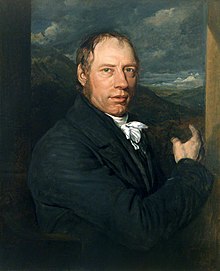Puffing Devil
| Richard Trevithick | |
|---|---|

1816 by John Linnell
|
|
| Born |
13 April 1771 Tregajorran, Cornwall, England |
| Died | 22 April 1833 (aged 62) Dartford, Kent, England |
| Citizenship | British |
| Nationality | English |
| Fields | Inventor, mining engineer |
| Known for | Steam locomotives |
Richard Trevithick (13 April 1771 – 22 April 1833) was a British inventor and mining engineer from Cornwall, England. The son of a mining captain, and born in the mining heartland of Cornwall, Trevithick was immersed in mining and engineering from an early age. He performed poorly in school, but went on to be an early pioneer of steam-powered road and rail transport. His most significant contribution was the development of the first high-pressure steam engine. He also built the first full-scale working railway steam locomotive. On 21 February 1804 the world's first locomotive-hauled railway journey took place as Trevithick's unnamed steam locomotive hauled a train along the tramway of the Penydarren Ironworks, in Merthyr Tydfil, Wales.
Turning his interests abroad, Trevithick also worked as a mining consultant in Peru and later explored parts of Costa Rica. Throughout his professional career, he went through many ups and downs, and at one point faced financial ruin, also suffering from the strong rivalry of many mining and steam engineers of the day. During the prime of his career, he was a well-respected and known figure in mining and engineering, but near the end of his life he fell out of the public eye.
Richard Trevithick was born at Tregajorran (in the parish of Illogan), between Camborne and Redruth, in the heart of one of the rich mineral mining areas of Cornwall. He was the youngest-but-one child and the only boy in a family of six children. He was very tall for the era at 6 ft 2in, as well as athletic and concentrated more on sport than schoolwork. Sent to the village school at Camborne, he did not take much advantage of the education provided – one of his school masters described him as "a disobedient, slow, obstinate, spoiled boy, frequently absent and very inattentive". An exception was arithmetic, for which he had an aptitude, but arrived at the correct answers by unconventional means.
...
Wikipedia
